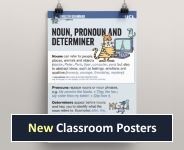Glossary
The Englicious Glossary includes the new National Curriculum glossary terms, which are shown against a white background. However, there's much more to be found here:
- we have added many entries that we feel are important, but cannot be found in the NC Glossary (e.g. connective), and
- in many cases we have added information to the (often very brief) NC entries that need further explanation (e.g. clause and phrase).
Please note that in line with our practice throughout the site, we use capital letters for function terms such as Subject, Direct Object, Indirect Object, Modifier, etc. Although this convention is not followed in the documentation published by the Department for Education we have also done so in the text that forms part of the National Curriculum Glossary.
Tip: Within our units and resources, Glossary items appear highlighted within the text. When you hover over them, or click on them in the Slideshow, a popup is generated.
tag question
tense
Tense is a grammatical notion, and refers to the way that time is encoded in language, typically through verb endings (inflections).
In English, tense is the choice between present tense and past tense verbs, which is special because it is signalled by inflections and normally indicates differences of time. In contrast, languages like French, Spanish and Italian have three or more distinct tense forms, including a future tense. (See also: future.)
The simple tenses (present and past) may be combined in English with the perfect and progressive.
- He studies. [present tense – present time]
- He studied yesterday. [past tense – past time]
- He studies tomorrow, or else! [present tense – future time]
- He may study tomorrow. [present tense + infinitive – future time]
- He plans to study tomorrow. [present tense + infinitive – future time]
- If he studied tomorrow, he’d see the difference! [past tense – imagined future]
Contrast three distinct tense forms in Spanish:
- Estudia. [present tense]
- Estudió. [past tense]
- Estudiará. [future tense]
text grammar
text-world
A text-world is a mental image that is triggered by language and fleshed out by a reader's own background knowledge. For example, in the sentence the black dog looked menacingly at the nervous postman, a text-world is constructed out of nouns (dog, postman) and Modifiers in the form of adjectives (black, nervous) and adverbs (menacingly).
My knowledge of the world (in this instance of dogs and postmen) fleshes out the detail - although there is nothing in the text that states it, I imagine the dog to be big and snarling, and the postman to be wearing a uniform and carrying a large bag.
Thinking about language like this allows us to appreciate that the way we interpret texts is a result of two things: (1) the text itself, and (2) our own, unique personal experiences, memories and background knowledge.
thought verb
topicalisation
transitive preposition
transitive verb
A transitive verb takes at least one Object in a sentence to complete its meaning, in contrast to an intransitive verb, which does not.
- He loves Juliet.
- She understands English grammar.
tree (diagram)
trigraph
A type of grapheme where three letters represent one phoneme.
- High /haɪ/
- pure /pjʊə/
- patch /pætʃ/
- hedge /hɛdʒ/

